I tested the Xiaomi 4 Compact air purifier some time ago, which I will compare to the Xiaomi Mi 3H in this article. It is an absolute pleasure to compare Xiaomi’s fourth-generation air purifier with the legendary Xiaomi Mi 3H.
In essence, these are two slightly different air purifiers, especially if we compare their room coverage. The Xiaomi 4 Compact covers small rooms of up to 206 sq. ft., while the Xiaomi Mi 3H has almost double the coverage of the 4 Compact, covering rooms of up to 484 sq. ft.
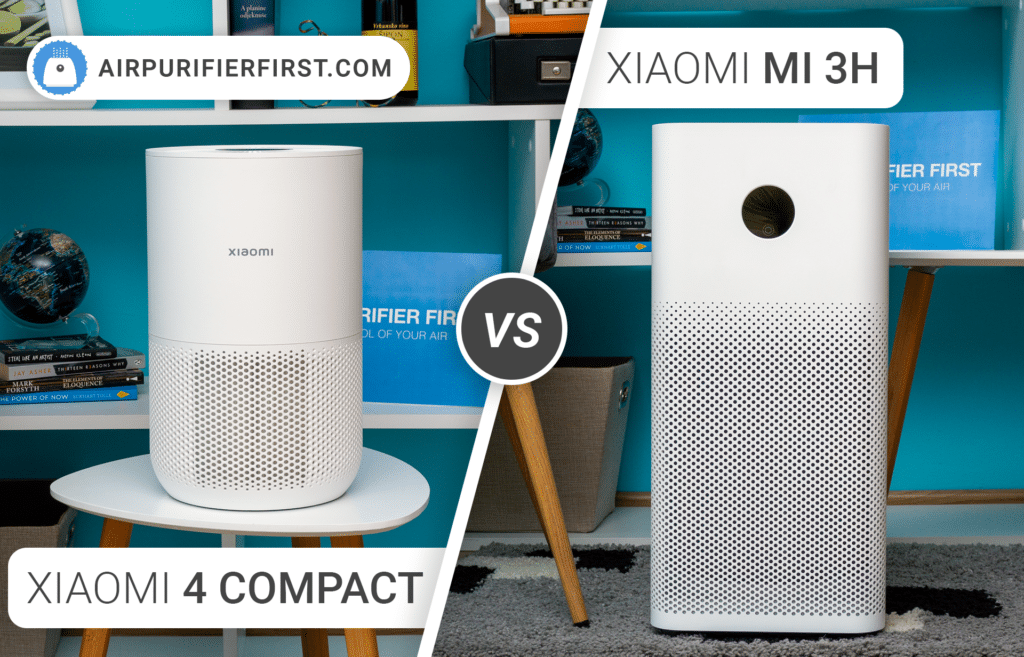
Table of Contents
When we talk about features, both devices are smart, have plenty of advanced features, and there is almost no difference between them. Both air purifiers have an air quality sensor and an air quality indicator and can be connected to the Mi Home App. As for the filtration technology, there is also not much difference because both use 3-stage filtration technology. The only significant difference in filtration is the slightly larger size of the Xiaomi Mi 3H filter.
Although these two air purifiers are intended for rooms of different dimensions, this does not mean that the Xiaomi 4 Compact can’t surprise in the tests and turn out to be a better choice for purchase. All in all, keep reading to find out which of these two is my recommendation.
Specs: Xiaomi 4 Compact Vs Mi 3H
| Product Image | 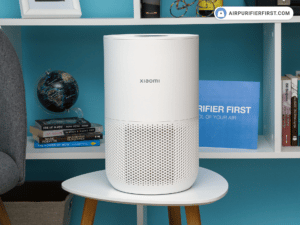 | 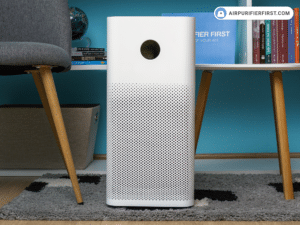 |
| Manufacturer | XIaomi | Xiaomi |
| Model | 4 Compact | Mi 3H |
| Dimensions (inches / cm) | Φ8.6 x 14 inches (Φ22.0 x 35.5 cm) | 9.5 x 9.5 x 20.5 inches (24 x 24 x 52 cm) |
| Weight (pounds / kg) | 4.85 lb (2.2 kg) | 10.6 lb (4.8 kg) |
| Clean Air Delivery Rate (CADR) | 135 CFM (230 m³/h) | 223 CFM (380 m³/h) |
| Coverage (4.8 ACH)
Room Coverage Explanation: ACH is a measurement used in indoor air quality management to indicate how many times the air within a defined space is changed/moved through the filter media.
For more details, visit our ACH calculator tool. | 206 sq. ft. (19 m²) | 484 sq. ft. (45 m²) |
| Performance Ratings Performance Ratings Score Summary: 8.5 - Average Score (67 products) 9.8 - Best Score (2 products) 2.5 - Worst Score (2 products) We use the Temtop LKC-1000S laser particle meter to test the particle removal efficiency of every air purifier. It measures PM2.5 (µg/m3), PM10 (µg/m3), Particles (per/L), and HCHO (mg/m3) in the air, and also calculates the AQI. You can read more about our testing methodology here. | ||
| Filtration Technology | Primary Filter, Xiaomi’s High Efficiency-Filter, and Activated Carbon Filter | Pre-filter, True HEPA and Active Carbon Filter |
| Filter Replacement Indicator | Yes | Yes |
| Filter Life | 6-12 months | 6-12 months |
| Power Consumption
Power Usage Summary: Our extensive testing of 67 air purifiers revealed the following power consumption insights:
Check out our power consumption calculator tool. | 27W | 38W |
| Operating Costs Ratings Operating Costs Ratings Score Summary: 9.1 - Average Score (67 products) 10 - Best Score (2 products) 8 - Worst Score (1 products) We measure the power usage at all speeds using an energy meter, after which we calculate how much it would cost to use the device at a particular fan speed for one month. For reference, we use an energy price of $0.12 per kWh. You can read more about our testing methodology here. | ||
| Number of Fan Speeds | 3 – Automatic Mode, Sleep Mode, and Manual Mode | 6 – Automatic Mode, Sleep Mode, Speed 1, Speed 2, Speed 3, and Manual Mode |
| Air Quality Sensor Air Quality Sensor Summary: Out of 67 air purifiers tested, only 31 have the air quality sensor. | Yes | Yes |
| Air Quality Indicator | Yes | Yes |
| Auto Mode Auto Mode Summary: Out of 67 air purifiers tested, only 32 have auto mode functionality. | Yes | Yes |
| Smart App Smart App Summary: Out of 67 air purifiers tested, only 20 have smart app functionality. | Yes | Yes |
| Voice Control Voice Control Summary: Out of 67 air purifiers tested, only 20 have voice control functionality. | Yes | Yes |
| Other Features | Light SensorDisplay Lock | Temperature and HumidityParental ControlsDisplay Off |
| Noise Level (low – high) | 41.3 – 60.4 dBA | 40.9 – 65.4 dBA |
| Noise Ratings Noise Ratings Score Summary: 9.3 - Average Score (67 products) 10 - Best Score (1 products) 8.2 - Worst Score (1 products) We use a special noise measurement tool to test the noise level of the air purifier at all speeds. We measured the noise level on the dBA scale. You can read more about our testing methodology here. | ||
| Best Suited For | Bedrooms Small Spaces Portable Use Smart Home Integration | Living Rooms Kitchens Offices Allergies Large Spaces Smart Home Integration |
| Warranty | 1-year | 1-year |
| In-Depth Review | XIaomi 4 Compact | Xiaomi Mi 3H |
| Price | Check Price on Amazon | Check Price on Amazon |
Features Overview
It is not easy to compare two appliances serving the same purpose while belonging to the same product family. Some of the main features in common are the air quality sensor and indicator, auto, sleep, and manual mode, and filter reset indicator.
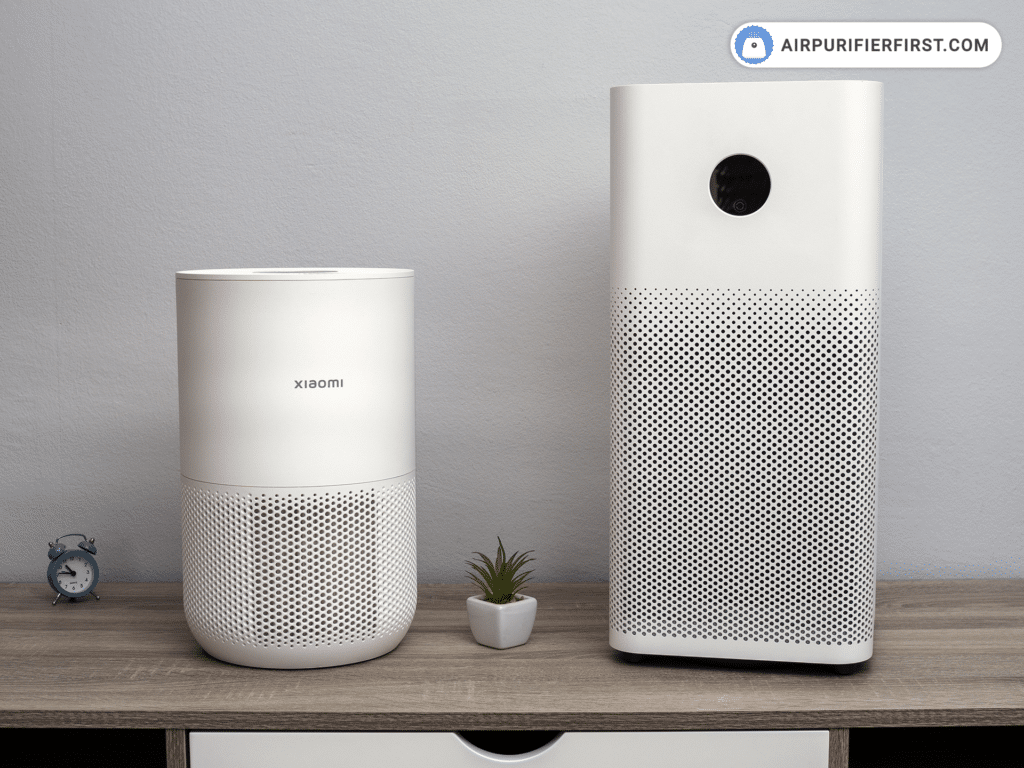
The best thing is all of the features are available through a Smart app connection, which means you can control the air purifier as much as you like.
Air Quality Sensor and Air Quality Indicator
Here’s an interesting part. While Xiaomi Mi 3H has a laser particle sensor that can detect real-time dust amount in the room, Xiaomi 4 Compact has an infrared particulate matter sensor detecting the real-time PM2.5. The Mi 3H sensor can also detect smoke and some VOCs.
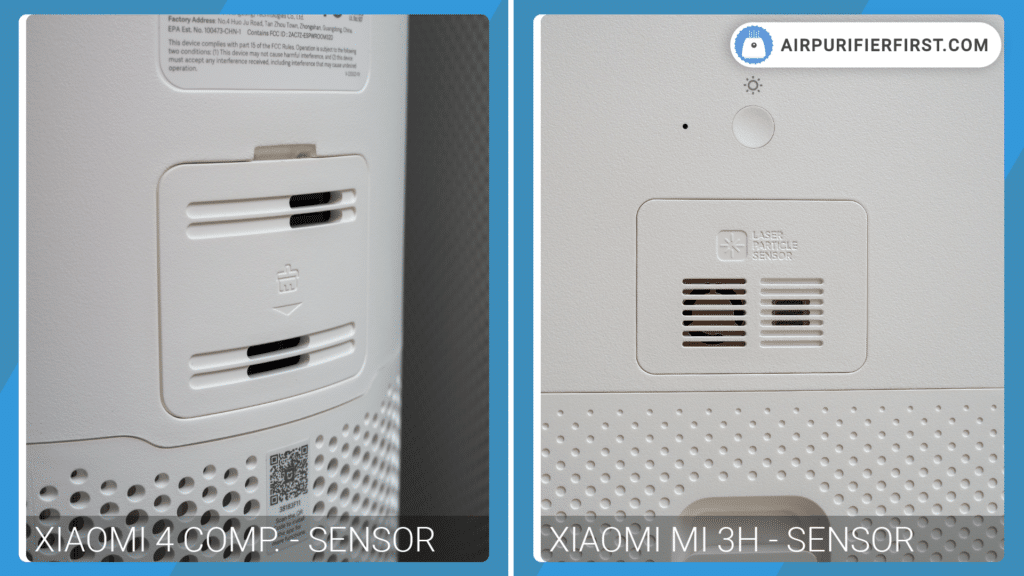
The LED indicator on top of Compact tends to switch colors depending on the real-time air quality and the PM2.5 concentration. The same works for the Mi 3H air quality indicator.
Along with the air quality sensor, Xiaomi Mi 3H has a temperature and humidity sensors that can be seen both on display and via the Smart app, detecting the real-time room temperature and humidity percentage.
Auto Mode
One of the cool and helpful options an air purifier can offer to a user is to take the matter into its own ‘’hands’’. This is exactly what the Auto mode is all about. It runs jointly with the air quality sensor. It goes like this: once you turn the Auto mode, all the data collected by the air quality sensor will be the trigger for switching an air purifier into a specific speed mode. Both Xiaomi 4 Compact and Xiaomi Mi 3H have this feature.
Sleep Mode
The good thing is that the Sleep modes within Xiaomi 4 Compact and Xiaomi Mi 3H are stand-alone speed levels. This mode actually decreases the speed level to the lowest, so the noise it produces is minimal. As a matter of fact, I discovered that the Mi 3H is even more silent than the Xiaomi 4, but you can read about it in the Noise section.
If you want to use the air purifier in the bedroom during the night you should consider dimming the LED indicators on top of Xiaomi 4 or pressing the Display OFF button on Mi 3H.
Manual Mode
The Manual mode is one of the common features of Xiaomi 4 Compact and Mi 3H. To use this feature, you must activate it via the control board. Later on, you can only use it through the app. The name itself means you can make the necessary adjustments to make the air purifier operate as you wish.
With Xiaomi 4 Compact, the appliance remembers the last settings and runs accordingly as soon as you switch to Manual mode. With Mi 3H, you can adjust the operating mode by inputting the room size, and the air purifier will instantly adapt and set the proper fan speed.
Light Adjustment
This is one of those features that don’t seem relevant at first, but do get used a lot. So basically you can adjust the level of brightness that various Xiaomi 4 Compact indicators emit. It also means you can completely dim all the buttons, except the Power button which will always light up.
This option is available within Xiaomi Mi 3H too, but as a Display Off button. You can use this button to dim the lights, or entirely shut them off. You can find it on the rear part of the device, but you can also adjust it through a Smart app.
The most important thing is these light adjustments make it easier for you to use the air purifier in your bedroom during the night.
Filter Reset Indicator
It is a good thing to always have some sort of reminder of the things that need to be done but could get forgotten due to everyday to-do lists. That is what the filter reset indicator is for, to remind you of the time when the filters need to be replaced.
Both Xiaomi’s products, Xiaomi 4 Compact and Mi 3H have this option installed. In addition to it, not only can you monitor the filter wornness on the display, but through the smart app as well. The indicator will light up to warn you, but the app will also send you a notification so you know how long you have left before the filter is out.
Timer
I think that, with this feature, Xiaomi Mi 3H has stepped up a little more than many other devices, even from the same company. You get to use this option only through the App, and you can do it in several ways. Normally, you get to pick at what time you want your home appliance to turn ON or OFF. Also, you can adjust the time range within which your air purifier will be running.
Lock screen / Child Lock
Whether you wish to name it Lock screen or Child lock, this option is available on both today’s Xiaomi devices.
They are lock buttons on the control panels of Xiaomi 4 Compact and Mi 3H, but you can also activate this option by using the Mi Home app. Once you activate it, the appliance can only be used through the app. This is a great thing, especially if you have toddlers exploring the world around you.
Mi Home App
One of the things that certainly makes life much easier is Smart apps. The Xiaomi company has recognized this and thus invested in creating a supporting app for the majority of its products. Both Xiaomi 4 Compact and Xiaomi Mi 3H can be connected, and fully controlled by the app.
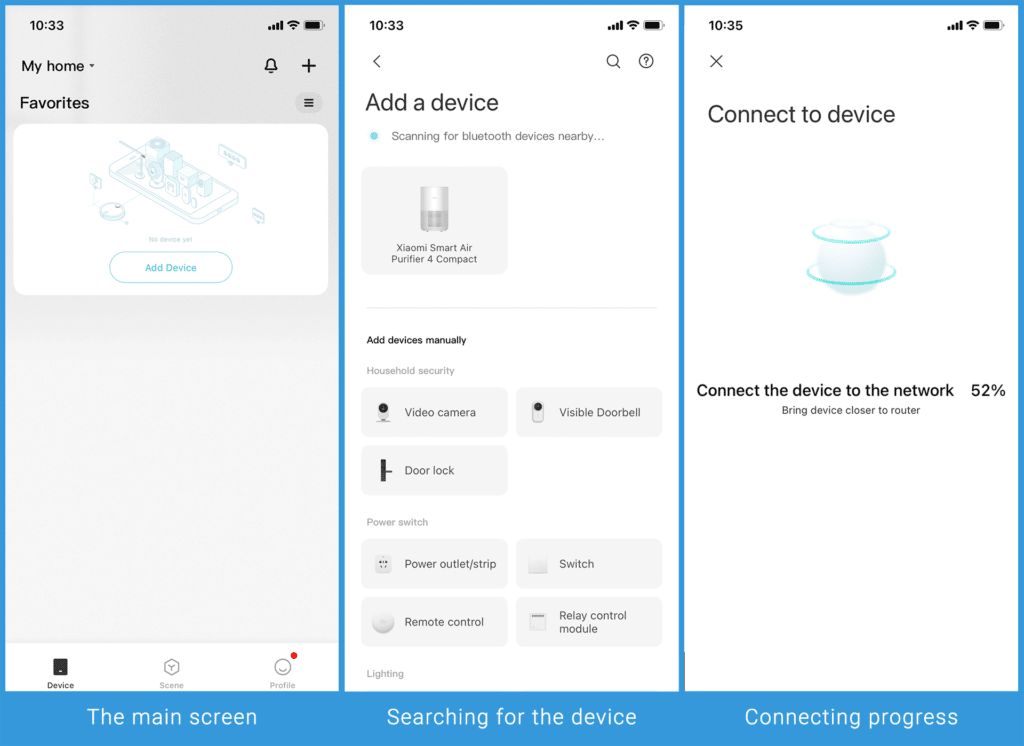
All of the features available manually get even more complex within the App itself.
Whether you are an Android or an iOS user, you can download the Mi Home app, install it and log in. This also means you can control it through Google Home and Alexa voice control. Both options are available within Compact as well as Mi 3H.
Control Panel
One of the most obvious visual differences between today’s Xiaomi opponents is the Control display. While Xiaomi 4 Compact has the ‘’traditional’’ styled panel on top, the Xiaomi Mi 3H has an OLED display on the front. While there are several buttons available on the Compact version, the Mi 3H has only one button that can be used for multiple purposes.
Airflow
Even though they are different in shape and size, both products of the Xiaomi family have a cylindrical filter inside. However, unlike Xiaomi 4 Compact, which has air inlets all over its body, Xiaomi doesn’t have them on the backside.
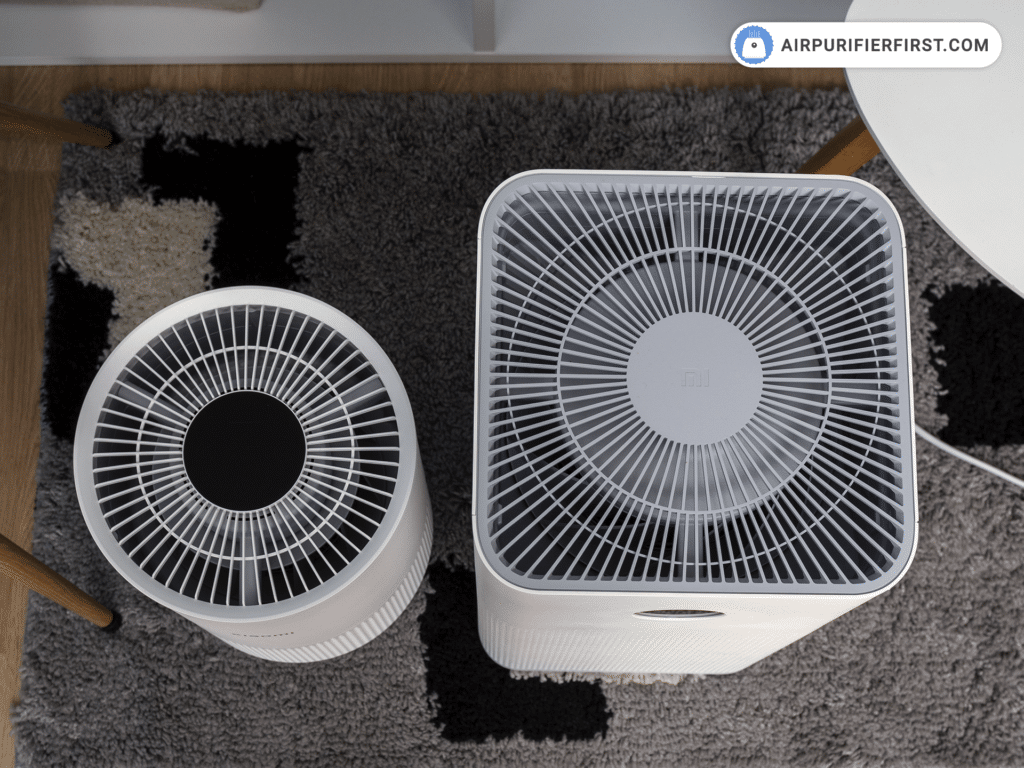
Nevertheless, the filtration process is the same. Once the air is in, it runs through filters and gets dispersed into the room through the grills on top.
Warranty
Contrary to what you may believe, Xiaomi products are mainly covered with a 1-year warranty, and that’s it. In my modest opinion, such a producer should offer much more, especially given the price of Xiaomi 4 Compact and Xiaomi Mi 3H.
Filtration Technology
A simple yet very efficient filtration technology consisting of a pre-filter, a True HEPA filter, and an activated carbon filter is present within both Xiaomi 4 Compact and Xiaomi Mi 3H air purifiers.
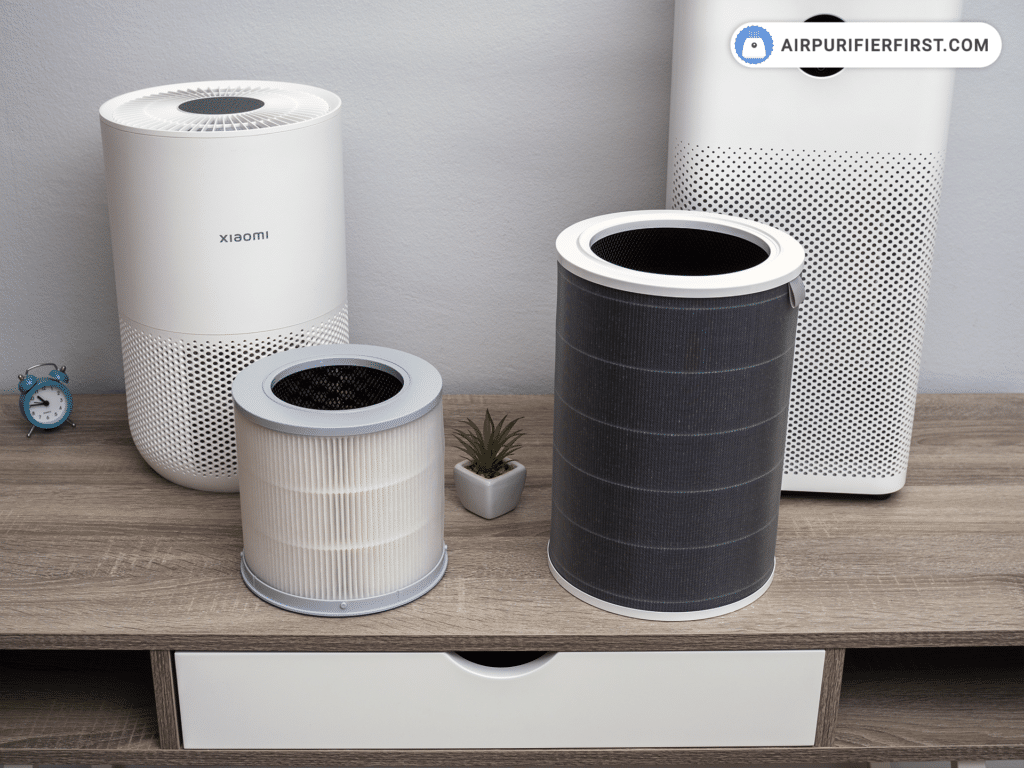
One of the advantages that Xiaomi Mi 3H has is the possibility of buying extra filters such as an Anti-formaldehyde S1 and an Antibacterial filter, to increase the air improvement rate.
Pre-filter
Sometimes I like to think of a pre-filter as a big brother, taking care of his younger siblings. One of the most important roles this filter has is to protect the True HEPA filter from all the larger particles threatening to suffocate the star of the filtration process.
Pet hair, dander, cotton fibers, larger dust particles, you name it, the pre-filter will trap it. Neither Compact nor Mi 3H has washable pre-filters, so do yourself a favor and wipe or vacuum if you want it to last long.
True HEPA Filter / Xiaomi’s High-Efficiency Filter
Approximately 99.97% of small particles such as pollen, fine dust, cigarette smoke, and pet odors can be caught by this filter. This filter is proven the starring role of any reliable filtration system. Xiaomi Mi 3H even uses the upgraded version, a True HEPA Class 13 filter which is even better than the previous model.
Activated Carbon Filter
As the third filtration stage, an activated carbon filter is important for neutralizing the unpleasant and often non-smelly but potentially harmful gasses. Xiaomi 4 Compact and the Mi 3H both use a pellet-based carbon filter. What it has is a fibrous filter coated by carbon, that can absorb VOCs, formaldehyde, etc.
How to Replace Filters on Both of These Devices?
Replacing filters on either Xiaomi 4 Compact or Mi 3H will not take much of your time since it’s quite simple. Filters are cylindrical and can easily be removed and replaced with new ones.
As you can already imagine, with both of these air purifiers you will be notified by the filter reset indicator when it’s time to do the replacement. However, you can also use the additional help from the Mi Home app and do some closer monitoring on how the filter gets used over time.
Both air purifiers have a 6-12 months expiration deadline, but usually, both filters last around 6 months. If you wish to prolong the durability, you need to take better care of the filter, which includes vacuuming and wiping it from time to time.
Performance Test
So, straight at first, I would like to remind you that the Xiaomi 4 Compact can cover up to 206 sq. ft. room size, but the Xiaomi Mi 3H can go bigger and cover up to 484 sq. ft.
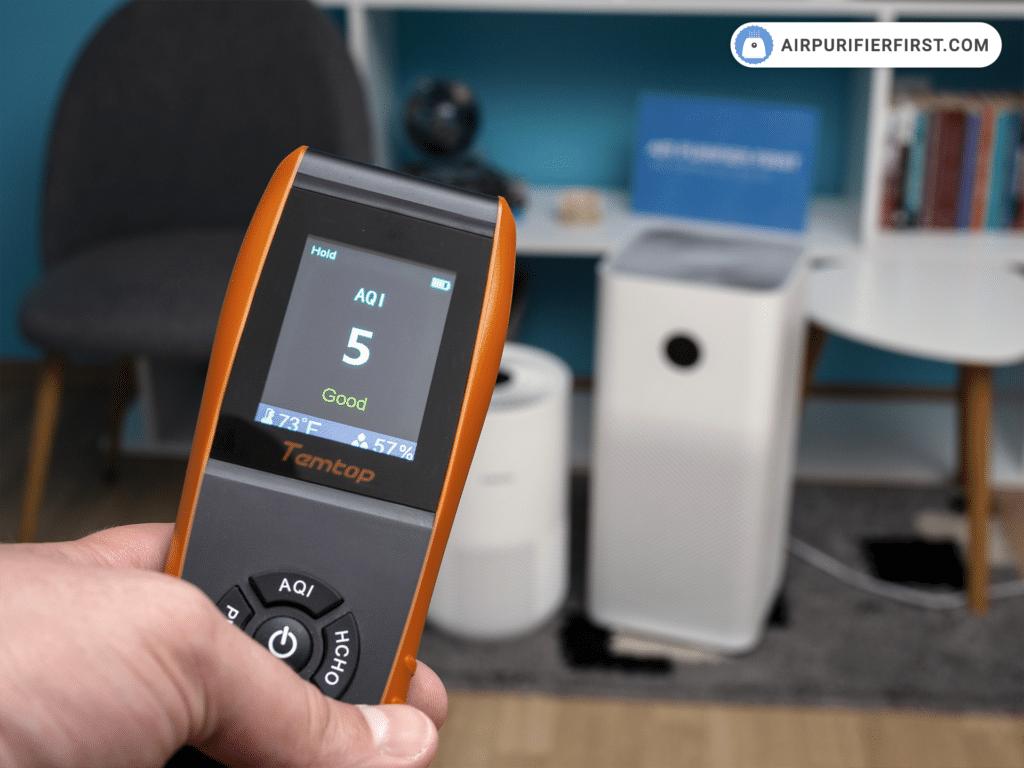
Does this seem challenging enough for a triple test to you too? I had to test both air purifiers in separate tests, for a 60-minute test on maximum speed level. Here is what I came up with.
194 sq. ft Room Test
Since Xiaomi 4 Compact is much closer to this room coverage, I decided to test this air purifier solely. I ended up with a 94% of air improvement rate, which was expected but also kind of a pleasant surprise.
320 sq. ft. Room Tests
To be able to actually compare these two air purifiers, I had to put them in a one-room size and see the results. As it turned out, Mi 3H was expectedly good with a 95% of air improvement rate. However, the Compact version didn’t lag behind too much. With 91% of improved air quality, I was more than pleased. Especially, since it is designed to cover much smaller places.
320 sq. ft. Room
* Data measuring time is 60 minutes.
560 sq. ft. Room Test
Rooms this big would’ve been too much for an air purifier such as Xiaomi 4 Compact to handle, so I didn’t even want to try. But, since this is a little bit larger room than what the designer of Mi 3H projected it for, I had to give it a try. As the result, 90% of air quality improvement just blew me away. This is a large, and therefore, a very powerful air purifier.
So, even though I respect and like the real power of Xiaomi 4 Compact, I must admit that Xiaomi Mi 3H is fairly a better choice in terms of performance power.
Noise Test
It could be demanding to compare such two different air purifiers in terms of the speeds available. At first, I tested Xiaomi 4 Compact while in Sleep mode, and the 41.3 dBA was more than pleasing to be around. Especially during the nighttime. Now as for the maximum speed noise, I have no complaints since the 60.4 dBA is not that big of a deal and almost unavoidable while trying to get the most out of the air purifier.
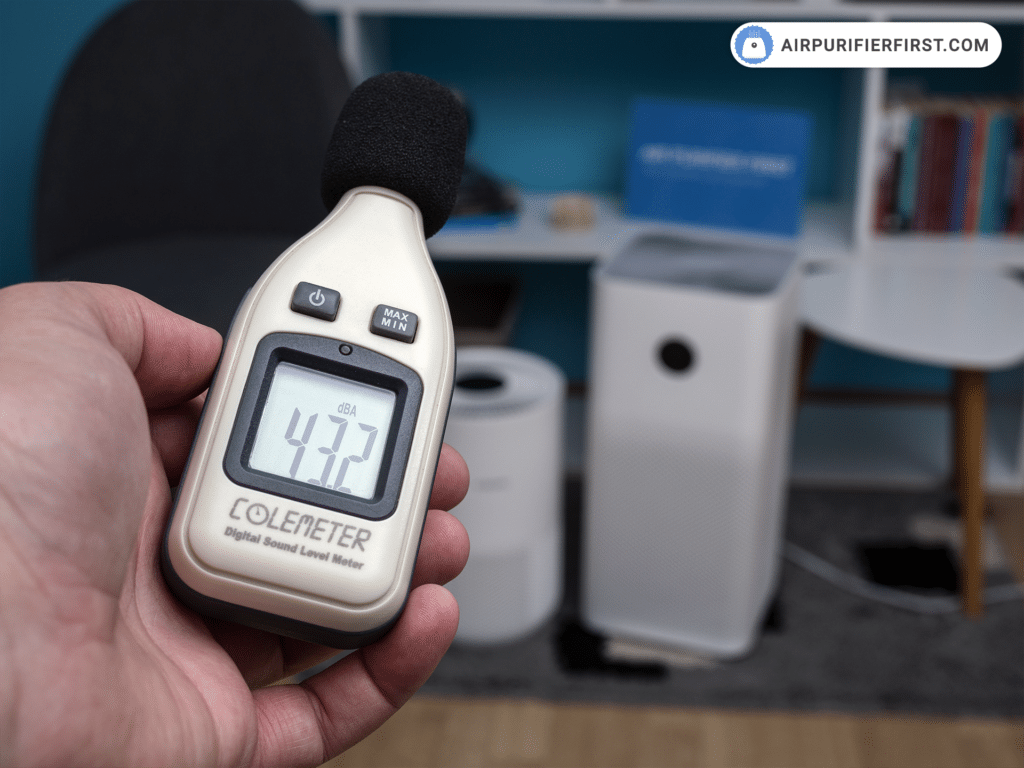
On the other hand, Xiaomi Mi 3H has far more speed options than the Compact, which made me go into details. As you would expect, the most silent speed option was the Sleep mode with only 40.9 dBA. Now, as the speed rose, so did the noise, but not in a bad way. The higher the speed, the better the airflow, right? Once I put the Mi 3H to a top speed, the noise was about 65.4 dBA.
| Product | Noise Range (dBA) |
|---|---|
| Xiaomi Mi 3H | 40.9 – 65.4 dBA |
| Xiaomi 4 Compact | 41.3 – 60.4 dBA |
Comparing these two air purifiers, each in its own environment and with its own capabilities, I honestly think both are equally good and pleasant to be around in the same room. No matter day or night.
Operation Costs
If you compared the initial product prices, you’d say that Xiaomi 4 Compact is cheaper than Xiaomi Mi 3H. Also, if you compared the filter replacement cost, you’d say the Compact is a more affordable air purifier. Especially, considering the same average annual replacement rate.
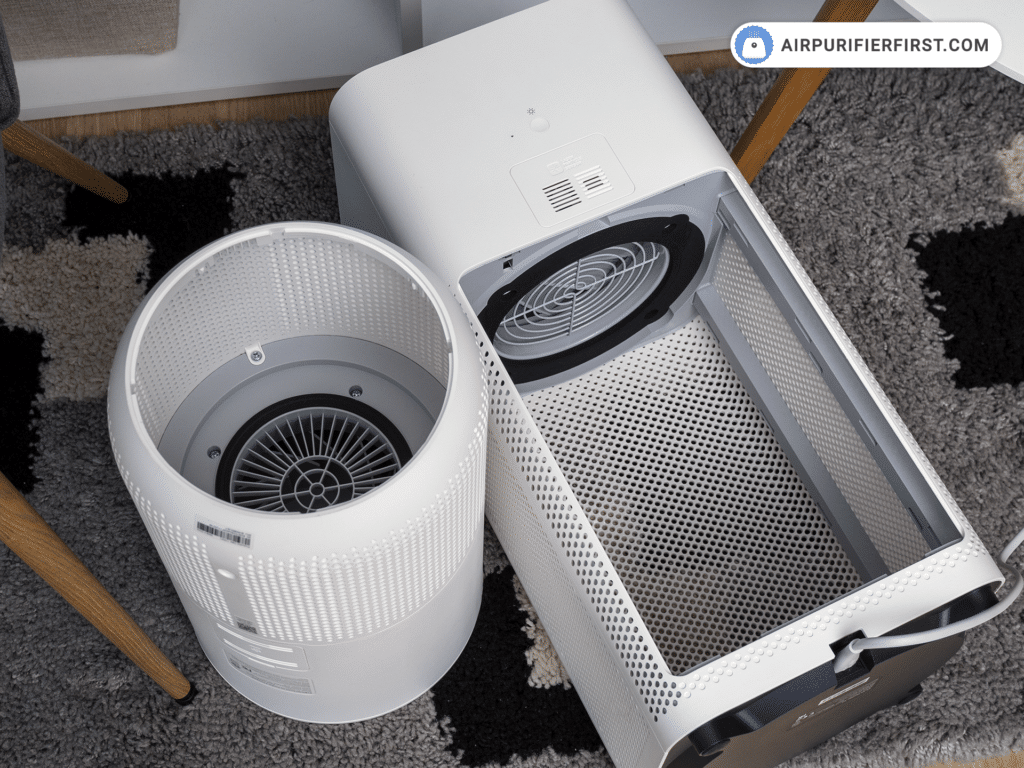
However, the Xiaomi Mi 3H turned out to be the better option in terms of affordability, and here is why.
I have put to the test both air purifiers for a whole month while running at max speed all day long. With a 27W motor power, Compact had cost me $2.10 by the end of the month, while Mi 3H resulted in $3.40 with a 38W powerful motor.
| Product | Wattage Range (W) |
|---|---|
| Xiaomi Mi 3H | 0.9 – 39W |
| Xiaomi 4 Compact | 1.8 – 24.2W |
Now, this may seem like the obvious advantage of Xiaomi 4 Compact, but Xiaomi Mi 3H is still a better choice. The fact that it is a way stronger and more efficient air purifier, one would expect it to cost more. Thankfully, this is not the case with this air purifier.
Xiaomi 4 Compact Vs Xiaomi Mi 3H – Video Comparison
Which One Is Better?
This fight may not be fair because the size and strength of the air purifier are one of the most important specifications, and in this situation, they run in favor of the Mi 3H. Perhaps this is also why the Xiaomi Mi 3H achieved slightly better results in performance tests, has more working modes, and is quieter when working at the lowest speed.
In my opinion, the Xiaomi Mi 3H is a better choice because it is stronger, has larger filters, did better in performance tests, and has slightly more advanced features.
Don’t get me wrong, the Xiaomi 4 Compact is almost an equally excellent air purifier, but more is needed to beat the Mi 3H. The situation in which I would choose the Xiaomi Mi 4 Compact instead is if I would use the air purifier primarily in the bedroom, in the office, or in a similar smaller room.
If you have questions regarding these two Xiaomi air purifiers, please comment in the comment box below.
Does Xiaomi compact 4 shows the AQI index or it just tells if its good bad or best? I think the Xiaomi 3H shows the exact AQI?
The Xiaomi 4 Compact doesn’t show specific values, only whether the air quality is good, bad, or best. However, the Xiaomi Mi 3H displays PM2.5 particulate matter in real time and also indicates if the air quality is good, bad, or best.
Here you say Xiaomi 3H is not using a pellet-based carbon filter, but here https://www.airpurifierfirst.com/comparison/blueair-411-auto-vs-xiaomi-mi-3h/ you say Xiaomi uses a pellet-based carbon filter.
Hi Peter,
Thanks for your comment.
I made a mistake in this comparison by stating that the Xiaomi Mi 3H doesn’t use a pellet-based carbon filter. In fact, both models use pellet-based carbon filters but with a very low concentration of carbon.
I confirmed this a few hours ago by opening the boxes and checking the filter material to see if there was carbon inside.
I confirmed this a few hours ago by checking the filters of both devices and confirming the presence of carbon pellets inside.
P.S. I fixed the typo; thanks again!